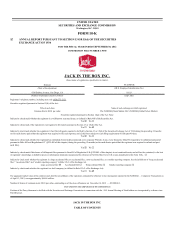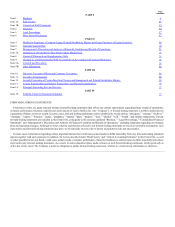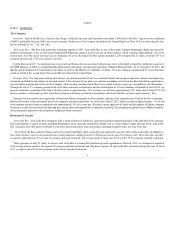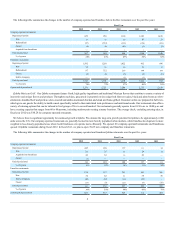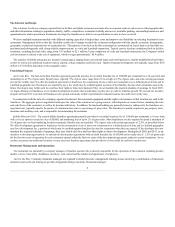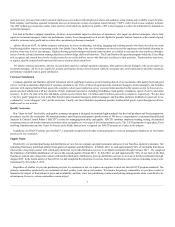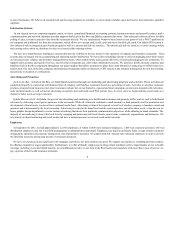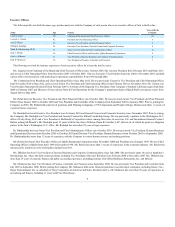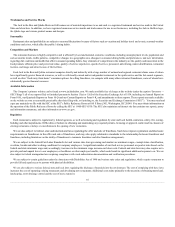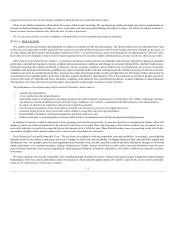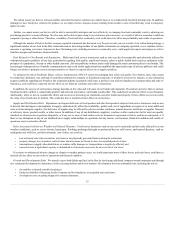Jack In The Box 2012 Annual Report Download - page 5
Download and view the complete annual report
Please find page 5 of the 2012 Jack In The Box annual report below. You can navigate through the pages in the report by either clicking on the pages listed below, or by using the keyword search tool below to find specific information within the annual report.
Site selections for all new company-operated Jack in the Box and Qdoba restaurants are made after an economic analysis and a review of demographic data
and other information relating to population density, traffic, competition, restaurant visibility and access, available parking, surrounding businesses and
opportunities for market penetration. Restaurants developed by franchisees are built to our specifications on sites we have reviewed.
We have multiple restaurant models with different seating capacities to help reduce costs and improve our flexibility in selecting locations for our
restaurants. Management believes that this flexibility enables the Company to match the restaurant configuration with the specific economic, demographic,
geographic or physical characteristics of a particular site. The majority of our Jack in the Box restaurants are constructed on leased land or on land that was
purchased and subsequently sold, along with the improvements, in a sale and leaseback transaction. Typical costs to develop a traditional Jack in the Box
restaurant, excluding the land value, range from $1.3 million to $2.1 million. Upon completion of a sale and leaseback transaction, the Company's initial
cash investment is reduced to the cost of equipment, which averages approximately $0.4 million.
The majority of Qdoba restaurants are located in leased spaces ranging from conventional large-scale retail projects to smaller neighborhood retail strip
centers as well as non-traditional locations such as airports, college campuses and food courts. Qdoba restaurant development costs typically range from $0.6
million to $1.0 million depending on the geographic region.
Jack in the Box. The Jack in the Box franchise agreement generally provides for an initial franchise fee of $50,000 per restaurant for a 20-year term and
marketing fees at 5% of gross sales. Royalty rates, typically 5% of gross sales, range from 2% to as high as 15% of gross sales, and some existing agreements
provide for variable rates. We offer development agreements to franchisees for construction of one or more new restaurants over a defined period of time and in
a defined geographic area. Developers are required to pay a fee, which may be credited against a portion of the franchise fee due when restaurants open in the
future. Developers may forfeit such fees and lose their rights to future development if they do not maintain the required schedule of openings. In fiscal 2009,
we began offering our franchisees a new market development incentive that would reduce royalty rates in order to stimulate growth. We revised our incentive
program in fiscal 2012 to provide all franchisees who opened restaurants within a specified time reduced franchise fees and lower royalty rates.
In connection with the sale of a company-operated restaurant, the restaurant equipment and the right to do business at that location are sold to the
franchisee. The aggregate price is negotiated based upon the value of the restaurant as a going concern, which depends on various factors, including the sales
and cash flows of the restaurant, as well as its location and history. In addition, the land and building are generally leased or subleased to the franchisee at a
negotiated rent, typically equal to the greater of a minimum base rent or a percentage of gross sales. The franchisee is usually required to pay property taxes,
insurance and ancillary costs, and is responsible for maintaining the restaurant.
Qdoba Mexican Grill. The current Qdoba franchise agreement generally provides for an initial franchise fee of $30,000 per restaurant, a 10-year term
with a 10-year option to extend at a fee of $5,000, and marketing fees of up to 2% of gross sales. Most franchisees are also required to spend a minimum of
2% of gross sales on local marketing for their restaurants. Royalty rates are typically 5% of gross sales with certain agreements at 2.5%, as described below.
We offer development agreements to franchisees for the construction of one or more new restaurants over a defined period of time and in a defined geographic
area for a development fee, a portion of which may be credited against franchise fees due for restaurants when they are opened. If the developer does not
maintain the required schedule of openings, they may forfeit such fees and lose their rights to future development. During fiscal 2010 and 2011, as an
incentive to develop target markets, we entered into development agreements with an initial franchise fee of $15,000 and a royalty rate of 2.5% of gross sales
for the first two years of operation for each restaurant opened within the first two years of the development agreement, subject to certain limitations. As we
continue to pursue non-traditional locations, we may enter into franchise agreements that provide for a lower initial fee and lower royalty rates.
Our restaurants are operated by a company manager or franchise operator who is directly responsible for the operations of the restaurant, including product
quality, service, food safety, cleanliness, inventory, cash control and the conduct and appearance of employees.
Jack in the Box. Company restaurant managers are required to attend extensive management training classes involving a combination of classroom
instruction and on-the-job training in specially designated training restaurants. Restaurant managers
6

